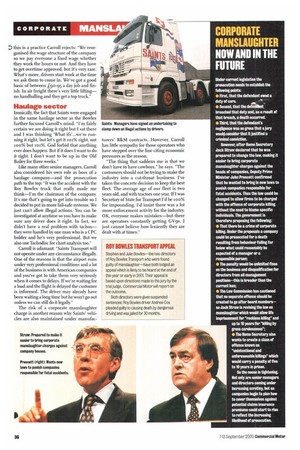CORPORATE MANSLAUGHTER NOW AND IN THE FUTURE
Page 38

If you've noticed an error in this article please click here to report it so we can fix it.
Under current legislation the prosecution needs to establish the following points: • First, that the defendant owed a duty of care.
• Second, that the deferiMint breached that duty and, as a result of that breach, a death occurred.
• Third, that the defendant's negligence was so gross that a jury would consider that it justified a criminal conviction.
However, after Home Secretary Jack Straw declared that he was prepared to change the law, making it easier to bring corporate manslaughter charges against the heads of companies, Deputy Prime Minister John Prescott confirmed that he wanted to bring in new laws to punish companies responsible for fatal accidents. Thus the law could be changed to allow firms to be charged with the offence of corporate killing without the need to blame specific individuals. The government is therefore proposing the following: • That there be a crime of corporate killing. Under the proposals a company could be prosecuted for a death resulting from behaviour falling far below what could reasonably be expected of a manager or a responsible person; • The penalty would be unlimited fines on the business and disqualification for directors from all management positions—this is broader than the current ban; • The Law Commission has cautioned that no separate offence should be created to go after board members— so Jack Straw is revising the law on manslaughter which would allow rife imprisonment for "reckless killing" and up to 10 years for 'killing by gross carelessness"; • The Home Secretary also wants to create a class of offence known as "unintentional and unforeseeable killings" which would carry a penalty of five to 10 years in prison.
So the noose is tightening. Not only are senior managers and directors coming under increasing scrutiny, but as companies begin to plan how to cover themselves against potential claims insurance premiums could start to rise to reflect the increasing likelihood of prosecution.
















































































































